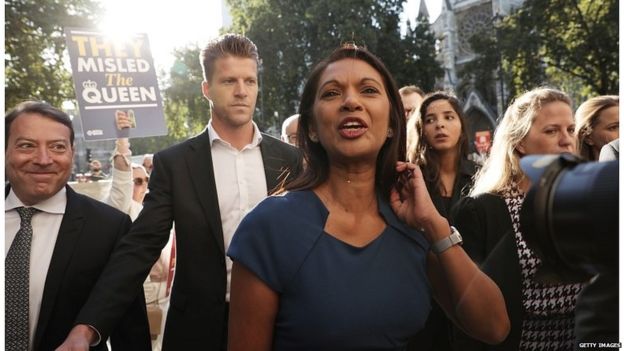Boris Johnson says the five-week prorogation is normal practice and will allow him to set out his policy plans in a Queen's Speech in October.
But a Scottish court ruled it was "unlawful" and was intended to "stymie" MPs' scrutiny in the run-up to Brexit.
Appealing that ruling, Lord Keen QC said the decision had "simply gone where the court could not go".
The Supreme Court is hearing two different appeals relating to prorogation this week.
The first concerns the Scottish case - the second concerns a ruling by the English High Court that came to opposite conclusion to that reached by the Court of Session in Edinburgh.
In that instance, judges decided suspending Parliament was a "purely political" move and was therefore "not a matter" for the judiciary.
That challenge was brought by businesswoman and campaigner Gina Miller.
Summing up Ms Miller's appeal on Tuesday, crossbench peer and QC Lord Pannick told the Supreme Court Mr Johnson suspended Parliament to avoid the risk of MPs "frustrating or damaging" his Brexit plans, and there was "strong evidence" the PM saw MPs "as an obstacle" and wanted to "silence" them.
Lady Hale, President of the Supreme Court, stressed the outcome of the appeals would have no bearing on the timing of Brexit.
In her opening statement, the most senior judge in the UK said she and her 10 colleagues would endeavour to address the "serious and difficult questions of law", but would not determine "wider political questions" relating to the Brexit process.
Mr Johnson maintains it was right and proper to terminate the last session of Parliament in order to pave the way for a Queen's Speech on 14 October, in which his new government will outline its legislative plans for the year ahead.
He insisted the move had nothing to do with Brexit and his "do or die" pledge to take the UK out of the EU on 31 October, if necessary without a deal.
But last week, Edinburgh's Court of Session found in favour of a cross-party group of politicians challenging the PM's move, ruling the shutdown was unlawful and "of no effect".
Scotland's highest civil court found Mr Johnson had effectively misled the Queen in the sovereign's exercise of prerogative powers.
SNP MP Joanna Cherry - who was also one of the lawyers on the case - told the BBC she was "cautiously optimistic" the Supreme Court would uphold the Scottish court's ruling.
But, she added: "If they don't, then they will be accepting that it's possible under the British constitution for the prime minister of a minority government to shut down Parliament if it is getting in his way, and that just can't be right."
Responding for the government, the Advocate General for Scotland, Lord Keen, told the Supreme Court he took "no issue" with the court's ruling that the decision could have been unlawful, but said to "declare that the prorogation is null and of no effect" was a step too far, adding: "They have simply gone where the court could not go."
He said if the ruling was upheld, the prime minister would take "all necessary steps" to comply.
However, after being pushed by the judges, he said he would not comment on whether Mr Johnson might subsequently try to prorogue Parliament again.
Lord Keen said previous prorogations of Parliament had "clearly been employed" when governments wanted to "pursue a particular political objective", adding: "They are entitled to do so."
He said if MPs did not want Parliament to be suspended they had "adequate mechanisms" and opportunities to stop it in its tracks by passing new laws - pointing to the fact a bill to block a no-deal Brexit was passed in just two days.
Lord Keen added: "It is not for the courts to overlay their views on when Parliament should or should not have [acted]... that would be to intrude over the boundaries of the separation of powers."
BBC
More about: UK
















































